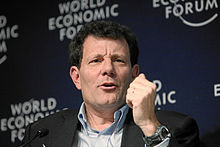The first quote that I wanted to discuss was when Kristof said "A child born in the bottom quintile of incomes in the United States has only a 4 percent chance of rising to the top quintile, according to a Pew study. A separate (somewhat dated) study found that in Britain, such a boy has about a 12 percent chance." Right from the start Kristof was pointing out how America may not be this great "land of opportunity" that it once was. He points out the fact that children born into poverty in Canada and European countries have a much better chance at making something of themselves than if the same child was born in America. Another quote in the text that was a great example was “The chance of a person who was born to a family in the bottom 10 percent of the income distribution rising to the top 10 percent as an adult is about the same as the chance that a dad who is 5 feet 6 inches tall having a son who grows up to be over 6 feet 1 inch tall." This quote that Kristof put in his article really visualized what he was trying to say. You have those people who will tell you that they "started from the bottom now they hea." (Drake, 2o13) and that's great. But for someone who started in poverty, that is a very hard feat to accomplish. Kristof was not putting those people down, but more so saying that it is extremely tough, even with hard work, to turn around a life of poverty. The final quote that I wanted to talk about is when Kristof says "Remember that disadvantage is less about income than environment. The best metrics of child poverty aren’t monetary, but rather how often a child is read to or hugged. Or, conversely, how often a child is beaten, how often the home descends into alcohol-fueled fistfights, whether there is lead poisoning, whether ear infections go untreated. That’s a poverty that is far harder to escape." This quote really spoke to what Kristof was trying to get across. It's not so much about income, but it's about what life the child was brought up in. For example, a child could grow up in a poverty stricken community. That child may have to go to school every day worrying more about his safety than he is about learning. I believe that these three quotes really exemplify what Kristof was trying to get across in this article.

(Nicholas Kristof)
Questions/Comments/Point To Share:
One thing that I loved that Kristof did was how he brought up the issue of entitlements. Most people who are above the poverty line think that those below it are just free loaders, and just take from the government. I really liked how he said it was a legitimate issue, but then goes on to say how people don't seem to complain when "zillionares" are claiming huge tax deductions. A question I would raise to the class is, "How do you guys feel about what he said regarding entitlements?"